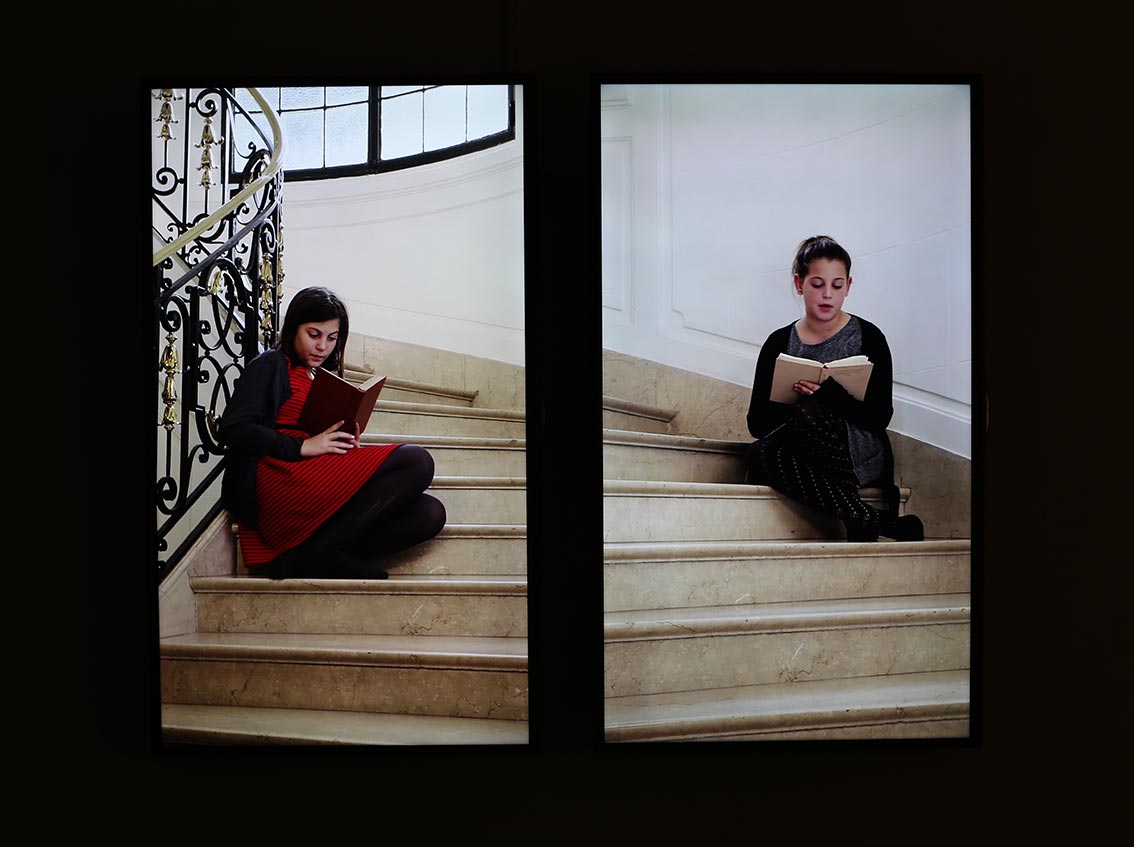 |
video: https://vimeo.com/177111933 ENSAYO PARA ULRIKE / REHEARSAL FOR ULRIKE. Videoinstalación de 2 canales. Dos niñas, un texto de Darío Fo. Sentadas sobre los peldaños de una escalera, ligeramente enfrentadas, cada una con un libro en la mano, descalzas, se turnan y dicen. Ambas recuperan la voz de una mujer que, encerrada sola en una prisión aséptica, convoca a la sombra de toda la humanidad. Las niñas transitan el texto con una voz que trasluce las contradicciones de este tiempo. Ellas también están en una transición, de la niñez a la adolescencia, pasando de una etapa de obediencia hacia otra de transgresión. Las inflexiones de sus voces marcan ese pasaje, entre el periodo de inocencia que aún no se va y la llegada inevitable de la conciencia, de saberse parte de este complejo mundo. Leen en voz alta, permanecen serias, cada tanto se miran decir. Reencarnan a Ulrike Meinhof, quien oculta, negada, excluida de todo derecho desenmascara ferozmente las paradojas de la sociedad y del sistema. Desde su encierro responde a un interrogatorio solitario, se pregunta y se responde, al tiempo que denuncia la peor de las torturas: «la privación de lo sensorial». Privación que no hace más que destacar la sobresaturación de estímulos que reina afuera, con el único fin de anestesiarnos completamente, de volvernos seres controlables y controlados, incomunicados, consumistas e insensibles al resto de los seres y del medio ambiente que nos rodea. Todo normalizado, estándar, liviano, acorde, extrañamente cómodo. Dentro, ella tiene el silencio que le permite pensar y recortarse del colectivo, ella tiene identidad. Dicen que la muerte es desprenderse de todo lo uno no es. Ulrike se sabe resistente, persistente. Sabe que la sombra no se puede eliminar, no se puede acallar, ni ocultar. Podrán prohibirlo todo, podrán asesinarla y ocultar su cuerpo, pero no borrar su palabra. Y como en una enantiodromía, dónde todo lo que es pasa a su contrario, de la montaña de carcajadas que finalmente Ulrike lanza hacia sus captores, las niñas terminan de leer y se hace un profundo silencio. • Ulrike Marie Meinhof: periodista y militante de la izquierda alemana durante las décadas de 1960 y 1970. Trabajó para la revista Konkret y estuvo comprometida con el movimiento de Oposición extraparlamentaria. En 1970 fue una de las fundadoras del grupo armado Fracción del Ejército Rojo (Rote Armee Fraktion, RAF) y también una de sus líderes durante los primeros años de existencia de la RAF. En 1972 fue arrestada por la policía y juzgada por numerosos cargos. En 1976, mientras se encontraba encarcelada y antes de que fuese condenada en firme, Meinhof apareció ahorcada en su celda.
REHEARSAL FOR ULRIKE A 2-channel video installation Two girls, a text by Dario Fo. Seated barefoot on the steps of a staircase, facing each other slightly, each with a book in their hand, they turn to each other and speak, reproducing the voice of a woman, who confined alone in a aseptic prison convokes the darkness of humanity. The girls pass through the text with voices that reveal the contradictions of the time. They are also in a transition from childhood to adolescence, passing from a stage of obedience to one of transgression. The inflexions in their voices mark that journey, between the period of innocence that they have still to leave and their inevitable awareness of the complexity of the world they find themselves in. They read aloud, their voices serious, occasionally looking at each other to speak. They embody Ulrike Meinhof, who is hidden and repressed, excluded from every right for her fearless exposure of the paradoxes of society and the system. From her imprisonment she is interrogated alone and endures the worst of tortures: the privation of the sensorial. Privation that does no more than highlight the overwhelming stimuli that reign outside, with the only purpose of anaesthetizing and forming beings that are controllable and controlled, in solitary confinement, consumers, insensitive to others and the surrounding environment. Everything normalized, standard, light, strangely comfortable. Within herself silence allows her to think and to stand out from the collective, she has identity. It is said that death is the casting off of everything that one is not. Ulrike knows how to be resistent, persisitent; knows that the shadow cannot be eliminated or silenced or hidden. They can ban everything, and kill her and hide her body but her words cannot be erased. And as in a enantiodromia, where everything surges against her, and from the volley of guffaws that in the end Ulrike launches against her captors, the girls finish reading, and a profound silence follows. • Ulrike Marie Meinhof: journalist and activist of the German left during the sixties and seventies. She worked for the magazine Konkret and was committed to the movement of the extra-parliamentary Opposition. In 1970 she was one of the founders of the armed group The Red Army Fraction, RAF and also one of their leaders during the first years of the RAF’s existence. In 1972 she was arrested by the police and faced numerous charges. In 1976, while she was jailed and before she was judged, Meinhof was found hanging in her cell. |